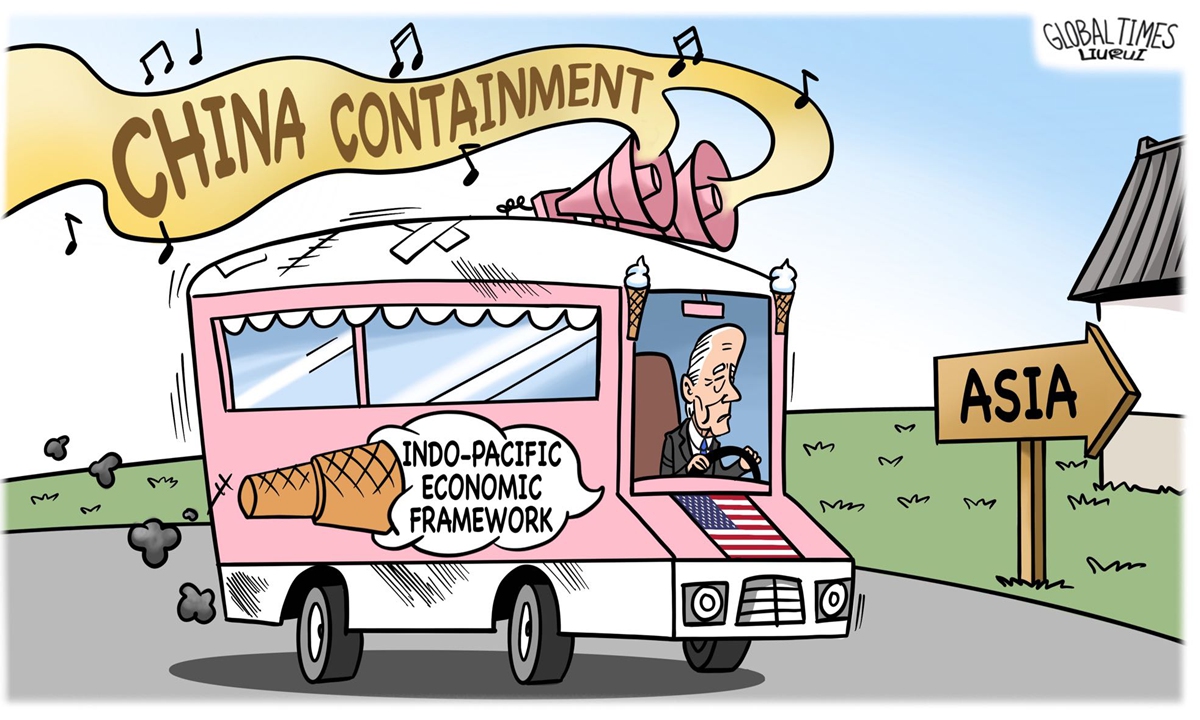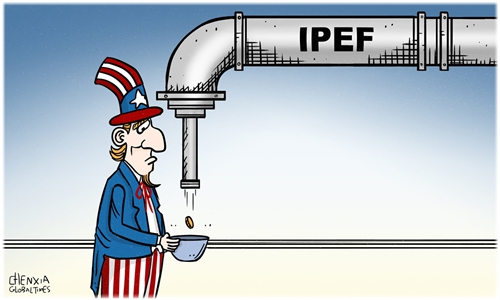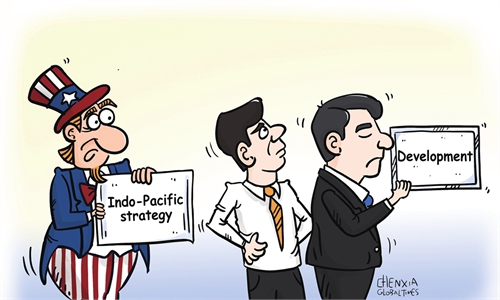US convenes IPEF meeting to ‘rally partners to counter China for US economic gains’

Illustration: Liu Rui/GT
As ministers of various countries participate in the US-led Indo-Pacific Economic Framework (IPEF) via video link on Tuesday, observers said the US, with its bankrupted credibility and declining strength, may find it hard to rally its partners with very different interests to push forward the IPEF into the direction the US wants.Since the launch of the IPEF by US President Joe Biden during a visit to Tokyo in May, the initiative has been widely criticized for its lack of substance, and member countries have expressed concerns about the IPEF's missing of tariffs and market access arrangements and its exclusion of China, a vital economy in the region.
As such, Chinese experts on international politics and trade said the Tuesday virtual meeting is more about the US effort to test the water and they do not expect concrete agreements to come out of the meeting. Any economic initiative in the region that excludes China will not work, they noted.
Officials representing the 14 IPEF member countries are set to take part in the meeting, co-hosted by US Trade Representative Katherine Tai and Commerce Secretary Gina Raimondo.
Topics for discussion at Tuesday's meeting include trade, supply chains, clean energy, infrastructure, taxes and combating corruption, according to media reports.
The meeting, which could see the IPEF morph from a set of principles into possibly a more concrete shape, comes at a time when the Biden administration is weighing whether to lift some of the tariffs it had imposed on Chinese goods during the Trump administration to ease record high inflation.
A Beijing-based expert on international relations, who preferred not to be named, described the meeting as an occasion for the US to test the reactions from all sides.
"While the US is evaluating what member states can do, it remains to be seen what the US can contribute to the framework. And pledges made by such a country marred by domestic chaos are sure to be viewed with suspicions by regional countries," the above-mentioned expert said.
Selfish intention
In the past two months, it has become increasingly apparent that the IPEF has nothing to do with the economy, but is purely a geopolitical strategy to contain China but is dressed up as an economic framework, He Weiwen, an executive council member of the China Society for World Trade Organization Studies, told the Global Times on Tuesday.
On Monday, US Deputy Secretary of Commerce Don Graves told a domestic think tank that it is essential for the US to revive strategic alliances with countries that "share democratic values and have economic interests." Efforts to realize the goal will include leveraging strategic and economic alliances, like the EU-US Trade and Technology Council (TTC), the IPEF, and the Quad, an informal security grouping of the US, Japan, Australia and India.
Wang Huiyao, president of think tank the Center for China and Globalization, told the Global Times on Tuesday that it is absurd that China, the Asia-Pacific's largest economy and second largest in the world, is not invited to participate in a regional economic initiative.
"The US' IPEF aims to engage countries in the region to marginalize China in economic fields," He Weiwen pointed out. "But Washington will be disappointed because any economic framework in the Asia-Pacific without China won't work."
China was the top trading partner of many of the IPEF countries in 2021, including Australia and South Korea.
Chinese observers believe very few countries will eventually buy into the US' blueprint for Asia-Pacific economic cooperation as the US is selfishly using member countries as vassals.
Zhao Gancheng, director of the Center for Asia-Pacific Studies at the Shanghai Institute for International Studies, told the Global Times on Tuesday the Biden administration seemingly has many lofty goals from formulating new trade rules to reorganizing the supply chains for high-tech sectors like chips, but IPEF members have their own difficulties to tackle as the pandemic prolongs.
"Two prominent members of the framework, Japan and South Korea, may make their own proposals for better access to the US market," Zhao said.
But it is very difficult for the US to further open its market to Asia-Pacific economies as it is battling an economic predicament at home, observers said. The US economy risks of falling into a mild recession by the end of 2022 or next year as the Federal Reserve raises rates to tame prices.
Under US pressure, South Korea seeks "active diplomacy" with China to make sure that there are no misunderstandings regarding its possible participation in the US-led semiconductor alliance "Chip 4," Yonhap reported on Friday. Experts believe it demonstrates a dilemma for regional countries, particularly US allies, amid Washington's mounting pressure to intervene in the Asia-Pacific economically.
Experts said the IPEF duplicates existing trade pacts and treaties across the region, including the Comprehensive and Progressive Agreement for Trans-Pacific Partnership (CPTPP).
"Let's wait and see what new things can be mapped out of the IPEF. Let's see what kind of concepts the US will hype," He Weiwen said, citing the TTC which has not churned out substance 13 months after its launch in June 2021.
Wang noted the IPEF can be seen as the US mimicking China-involved economic initiatives in the region, namely the China-proposed Belt and Road Initiative, the China-initiated Asian Infrastructure Investment Bank, China-participated CPTPP, and the Digital Economy Partnership Agreement which China applied to join in November 2021.
China's way to deal with the US' frequent tendency to make more groupings of regional countries is communications and exchanges on an equal footing, Wang said. "The majority of IPEF members are very interested in discussing economic matters with China and they benefit from such cooperation."





